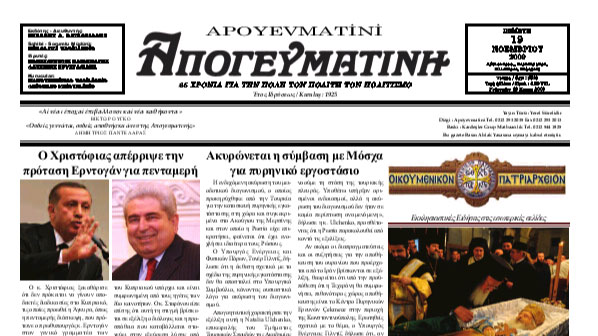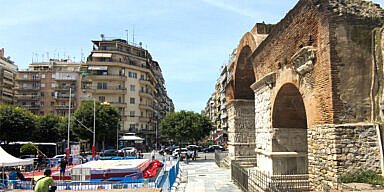Due to financial problems, the Greek-language newspaper “Apoyevmatini” which had been published in Istanbul since 1925, is set to close. Although the newspaper consisted of four pages alone, it not only kept Greek citizens in Turkey informed about current news, but it also helped keep the Greek language alive in a country where the Greek population has dwindled down over the years. The story of the decline of the population of Greeks in Istanbul is a long one, and the “Apoyevmatini” has gone hand in hand with the Greek families of Istanbul during some turbulent times.
At one point and time the newspaper sold as many as 30,000 copies a day, but unfortunately the decline of the Greek populace in Istanbul has coincided with the decline of the newspaper’s influence and financial state. The Greek community of Istanbul numbered around 68,000 in 1955, however after the Istanbul pogrom that spread fear to the Greek residents of the city, a mass exodus followed. Organized mob attacks were directed at Istanbul’s Greek minority after false news that the Turkish consulate in Thessaloniki, which also happens to be the house where Kemal Ataturk was born, had been bombed by Greeks. The Turkish government and media orchestrated the propaganda and resulted in riots and the destruction of Greek property within the city. After the riots, year by year, Greeks fled the city and now the Greek community consists of less than 3000 people.
According to the owner of the “Apoyevmatini” Mihalis Vasiliadis, there are only 605 families left in Istanbul. Nonetheless, the Greeks in Istanbul remain a close-knit group. Mr Vasiliadis said, “I sell 600 copies daily and reach almost 99% of them. However, that is not enough”. The newspaper had been facing economic issues for some time. Subscriptions and financial contributions from the Greek government only postponed the inevitable. During his career, Mr Vasiliadis faced numerous lawsuits in Turkey being accused of Greek propaganda. In addition, due to the economic crisis, Greek companies and foundations have been unable to support the newspaper as they have had in the past.
Moreover, Greek numbers in Turkey do not seem to be rising any time soon after the passing of a law in Turkey which prohibits citizens of Greece from acquiring any residential or business property in 28 coastal provinces of Turkey, including Istanbul. The law however allows the citizens of 183 other countries to purchase Turkish real estate. Despite the inhospitable environment Greeks face in Turkey, a progressive group of Turks showed their interest about the situation and wanting to help became subscribers to the newspaper. Their efforts though were not enough to save the newspaper which had been closely linked with the hardship the Greeks in Istanbul had faced over the years.



